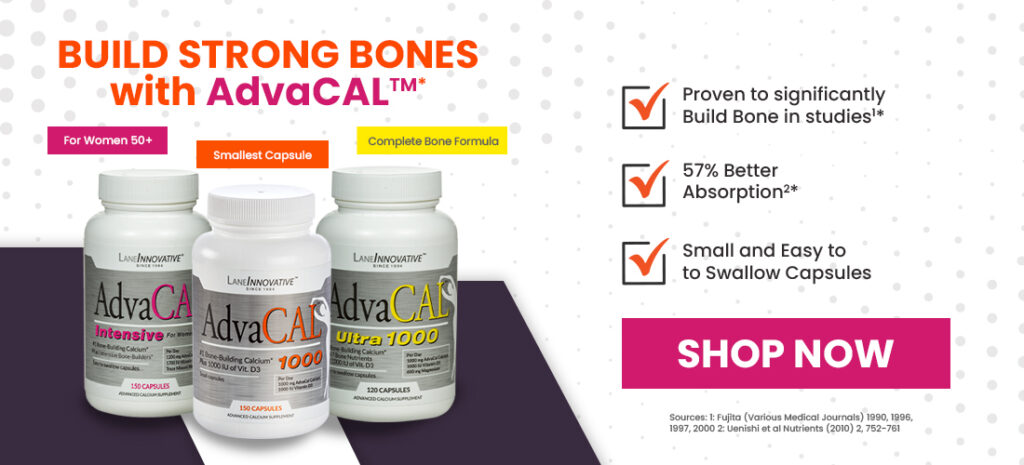Bone Health
4 Calcium Myths and Why This Valuable Mineral is Important for Bone-Building
When it comes to nutrients essential for health, calcium is one of the most misunderstood. Though it’s widely recognized for its role in bone health, calcium myths and misinformation have clouded the public’s understanding of how calcium works, where to get it, and why it’s so important—especially when it comes to building and maintaining strong bones.
In this article, we’ll break down the truth about calcium, clear up common calcium myths, and explain why this vital mineral deserves a central place in your daily nutrition.

Calcium and Your Body: More Than Just Bones
Calcium is the most abundant mineral in the human body. While most people associate calcium strictly with bone-building, its responsibilities extend far beyond that. About 99% of the calcium in your body is stored in your bones and teeth, giving them strength and structure. But the remaining 1% is equally important, playing a key role in muscle function, nerve signaling, and blood clotting.
However, if your diet lacks sufficient calcium, your body will draw from its calcium “bank”—your bones—potentially leading to bone loss over time. That’s why adequate calcium intake is crucial at every stage of life, from childhood to old age.
Calciums Myths 1: "If I Eat Dairy, I’m Getting Enough Calcium"
While dairy products like milk, cheese, and yogurt are good sources of calcium, they aren’t the only ones—and they’re not always the best option for everyone. Many people are lactose intolerant or choose plant-based diets, making it essential to find alternative sources.
Some excellent non-dairy sources of calcium include:
- Leafy greens such as kale, bok choy, and collard greens
- Fortified plant milks (like almond, soy, and oat milk)
- Tofu made with calcium sulfate
- Sardines and canned salmon (with bones)
- Fortified cereals and juices
The key is variety and consistency. Relying on a single food group may not be enough to meet your calcium needs, which range from about 1,000 to 1,300 mg per day for most adults, depending on age and gender [1].
Calcium Myths 2: "If I’m Not Old, I Don’t Need to Worry About Calcium"
It’s easy to think that calcium is something to consider only in later life, but that couldn’t be further from the truth. Your body builds most of its bone mass by your late twenties, meaning calcium is absolutely crucial during childhood, adolescence, and early adulthood.
Even in middle age, maintaining calcium intake helps slow the gradual bone loss that occurs naturally over time. By the time people begin to worry about bone strength, it can already be much harder to reverse the effects of years of low calcium intake.
Calcium matters throughout every stage of life—not just for the elderly.
Calcium Myths 3: "Calcium Supplements Are Not Necessary"
While getting calcium from food is ideal, the belief that supplements are never needed is misleading. In reality, calcium supplements can be a helpful and beneficial part of a balanced approach to nutrition—especially when your diet alone doesn’t provide enough.
People who avoid dairy, follow plant-based diets, have food allergies, or simply don’t get enough calcium-rich foods may benefit from taking a supplement to help meet their daily requirements. Supplements can also be useful during life stages when calcium needs increase, such as adolescence, pregnancy, and older adulthood.
That said, supplements work best when they support a healthy diet—not replace it. Getting calcium from a variety of whole foods also provides additional nutrients like magnesium, vitamin K, and protein, which work together to support bone health.
The takeaway: calcium supplements can be a valuable addition when used alongside a balanced diet. It’s about filling the gaps—not skipping the foundation.

Calcium Myths 4: "Not All Calcium Supplements Are the Same"
Not all calcium supplements are created equal—and understanding how well your body absorbs them can make a significant difference. The effectiveness of a calcium supplement isn’t just about how much calcium it contains, but how efficiently your body can absorb and use it.
Factors such as your age, digestive health, and even the time of day you take the supplement can affect absorption. Additionally, taking calcium in smaller doses throughout the day and ensuring you have enough vitamin D in your system can enhance how well it is absorbed.
The best calcium supplement is the one your body can absorb effectively and that fits your individual needs. It’s worth paying attention to how your body responds and consulting a nutrition expert if you’re unsure. Ultimately, absorption—not just dosage—is what makes a calcium supplement truly beneficial.
Calcium and Bone Loss: Connecting the Dots
One of calcium’s most critical roles is in supporting bone density. Throughout life, bones are constantly being broken down and rebuilt—a process called remodeling. Calcium plays a key role in the rebuilding phase, helping to form the mineral-rich matrix that gives bones their strength.
When calcium intake is insufficient, the body begins pulling calcium from bones to maintain essential functions like muscle contraction and nerve signaling. Over time, this can lead to bone loss, increasing the risk of weak, fragile bones later in life.
Weight-bearing exercise and a balanced diet rich in calcium and vitamin D can help maintain healthy bones and reduce the risk of future issues related to bone strength [2].
The Role of Vitamin D in Calcium Absorption
It’s not just about how much calcium you consume—it’s also about how well your body can use it. Vitamin D helps your body absorb calcium efficiently. Without adequate vitamin D, even a calcium-rich diet might not be enough to maintain bone health.
You can get vitamin D from sun exposure, fatty fish like salmon, and fortified foods, or consider a supplement if needed. Combining vitamin D with calcium intake supports optimal bone mineralization and strength [3].
The Bottom Line: Calcium Deserves More Credit—And Clarity
In today’s wellness culture, calcium doesn’t always get the attention it deserves. It’s often overshadowed by trendy nutrients or misunderstood due to outdated beliefs and misinformation. But the truth remains: calcium is an essential mineral that plays a vital role in bone-building and overall health and the idea of calcium myths are just that, they are myths.
To ensure you’re getting enough:
- Eat a diverse diet with calcium-rich foods
- Consider your vitamin D levels for optimal absorption
- Be mindful of supplement type and timing
- Focus on long-term habits, not quick fixes
With the right knowledge and a few simple changes, you can support your bones for a healthier, stronger future.
Sources:
Like? Share with Your Friends!

